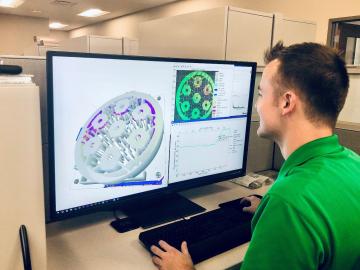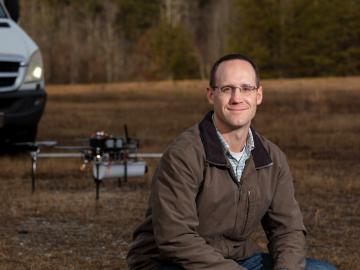
Filter News
Area of Research
- (-) Advanced Manufacturing (2)
- (-) Isotopes (2)
- (-) National Security (26)
- (-) Supercomputing (56)
- Biology and Environment (49)
- Biology and Soft Matter (1)
- Computational Biology (1)
- Computational Engineering (2)
- Computer Science (8)
- Electricity and Smart Grid (3)
- Energy Science (74)
- Functional Materials for Energy (1)
- Fusion and Fission (10)
- Fusion Energy (7)
- Materials (21)
- Materials for Computing (1)
- Mathematics (1)
- Neutron Science (9)
- Nuclear Science and Technology (11)
- Nuclear Systems Modeling, Simulation and Validation (1)
- Quantum information Science (1)
- Sensors and Controls (2)
News Topics
- (-) Advanced Reactors (3)
- (-) Artificial Intelligence (47)
- (-) Grid (11)
- (-) Security (15)
- 3-D Printing/Advanced Manufacturing (27)
- Big Data (25)
- Bioenergy (11)
- Biology (14)
- Biomedical (23)
- Biotechnology (3)
- Buildings (4)
- Chemical Sciences (5)
- Composites (3)
- Computer Science (105)
- Coronavirus (16)
- Critical Materials (3)
- Cybersecurity (23)
- Energy Storage (10)
- Environment (27)
- Exascale Computing (26)
- Frontier (32)
- Fusion (3)
- High-Performance Computing (45)
- Irradiation (1)
- Isotopes (27)
- Machine Learning (25)
- Materials (26)
- Materials Science (23)
- Mathematics (2)
- Microscopy (7)
- Molten Salt (1)
- Nanotechnology (11)
- National Security (37)
- Neutron Science (17)
- Nuclear Energy (12)
- Partnerships (5)
- Physics (9)
- Polymers (2)
- Quantum Computing (20)
- Quantum Science (26)
- Simulation (16)
- Software (1)
- Space Exploration (7)
- Summit (43)
- Transportation (8)
Media Contacts

An ORNL-led team comprising researchers from multiple DOE national laboratories is using artificial intelligence and computational screening techniques – in combination with experimental validation – to identify and design five promising drug therapy approaches to target the SARS-CoV-2 virus.

Deborah Frincke, one of the nation’s preeminent computer scientists and cybersecurity experts, serves as associate laboratory director of ORNL’s National Security Science Directorate. Credit: Carlos Jones/ORNL, U.S. Dept. of Energy

At the Department of Energy’s Oak Ridge National Laboratory, scientists use artificial intelligence, or AI, to accelerate the discovery and development of materials for energy and information technologies.

The Department of Energy’s Oak Ridge National Laboratory has licensed its award-winning artificial intelligence software system, the Multinode Evolutionary Neural Networks for Deep Learning, to General Motors for use in vehicle technology and design.

Twenty-seven ORNL researchers Zoomed into 11 middle schools across Tennessee during the annual Engineers Week in February. East Tennessee schools throughout Oak Ridge and Roane, Sevier, Blount and Loudon counties participated, with three West Tennessee schools joining in.

A new tool from Oak Ridge National Laboratory can help planners, emergency responders and scientists visualize how flood waters will spread for any scenario and terrain.

Six scientists at the Department of Energy’s Oak Ridge National Laboratory were named Battelle Distinguished Inventors, in recognition of obtaining 14 or more patents during their careers at the lab.

ORNL and three partnering institutions have received $4.2 million over three years to apply artificial intelligence to the advancement of complex systems in which human decision making could be enhanced via technology.

Oak Ridge National Laboratory researchers have developed artificial intelligence software for powder bed 3D printers that assesses the quality of parts in real time, without the need for expensive characterization equipment.

Horizon31, LLC has exclusively licensed a novel communication system that allows users to reliably operate unmanned vehicles such as drones from anywhere in the world using only an internet connection.


